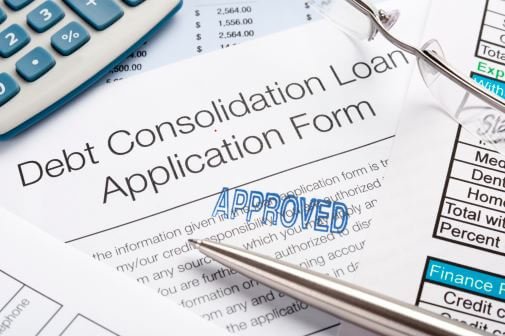Debt consolidation is when you borrow money from a lender and use that to pay off your other debts. Debt consolidation can be very helpful for people who are struggling with debt and want to get it all paid off at once. However, there are some things that you need to know before taking on debt consolidation as an option. We will discuss those in this blog post!
What is Debt Consolidation?
Debt consolidation is when you borrow money from a lender and use that to clear other liabilities. This can be very helpful for people who are struggling with debt and want to get it all paid off at once. Debt consolidation is helpful because it can help you to create a repayment plan that will work for your budget.
However, there are some things that you need to know before taking on debt consolidation as an option. We’ll discuss those in this post!
Check out: List of 10 Best Website Monetization Platforms
Three Things You Need To Know About Debt Consolidation
Debt consolidation is not right for everyone
You need to make sure that this option will work within your monthly budget before taking on any more debt. It’s also important to know what your credit score and the ratio of debt-to-income. This is because you might be denied if these numbers don’t meet a certain threshold.
Debt consolidation is not a quick fix to debt problems
You’ll still have to make monthly payments in order for the loan to clear. As a result, don’t think that it’s an easy way out of paying off all your debts. It’s also important to know that the interest rates on this type of loan can be high, and may even include a prepayment penalty.
Remember, you will be taking a loan to settle debts.
It’s best to consult with a financial advisor or credit counselor before taking on debt consolidation, because it may not be the right option for you if your income is too low and/or the ratio of debt-to-income is high.
Debt consolidation might not help you avoid bankruptcy
While debt consolidation will get rid of your other debts, it won’t keep you out of foreclosure or bankruptcy court if those are in your future. You’ll still need to make monthly payments in order for the loan to clear. However, it might not be easy or possible if your income is too low.
Don’t feel pressured into debt consolidation just because a bank offers you an attractive interest rate! You’ll want to consult with a financial advisor before taking on another liability that could increase your credit score but also affect your monthly budget.
Check out: Top 8 Factors to consider when making investment decisions
Debt Consolidation: The Good And Bad
The good side of debt consolidation is that it can help you create a repayment plan for all the debts that you’re carrying around with you. However, there are some things to consider before taking on this responsibility. You need to know what your credit score and debt-to-income ratio are to see if you have a chance of getting approved for this type of loan. You also need to know the interest rates, monthly payments, and prepayment penalties that are involved with debt consolidation before making any decisions!
The bad side of debt consolidation is that you may not be approved for this type of loan. Furthermore, it could not only increase your credit score but also affect your monthly budget. You’ll want to consult with a financial advisor before taking on another liability that could make matters even worse!
One thing is certain: Debt consolidation can help you get rid of all those other debt liabilities that are plaguing you and get you one step closer to being debt-free.
Types of Debt Consolidation
There are two types of debt consolidation: personal and business.
Personal Debt Consolidation
If you’re taking out a personal debt consolidation loan, it means that you’ll be consolidating your debts with this new one instead. You may have to pay off the old creditors at first in order for them not to call on their loans or bring about legal action. The benefit of this type is that you’ll be able to pay off all your debts at once.
In most cases, personal debt consolidation is a good option, but it’s not for everyone. The interest rates are usually lower than on other types of loans and there may be no prepayment penalties or credit score impact (depending on the company that you work with).
Business Debt Consolidation
If you’re taking out a business debt consolidation loan, it means that instead of paying off one creditor with another individual’s money or credit score through personal debt consolidation, you’ll be using your company’s profits to pay off the debt.
In most cases, this type of consolidation is a good option for businesses that are in solid financial shape and have low credit scores. The interest rates on these types of loans tend to be higher than with personal debt consolidation because they’re riskier bets, but there may not be any prepayment penalties or credit score impact.
Check out: 15 Best Ways to Monitor Credit
Requirements for Debt Consolidation
Debt consolidation will be an excellent option for you if your income is too low and/or the ratio of debt-to-income is high.
The requirements that most companies have are:
- A good credit score (above 625) with no bankruptcies or foreclosures in the past six years
- No other outstanding loans, unless they are at a much lower interest rate than your debt consolidation loan
- A reasonable income-to-debt ratio (less than 30%)
- No more than 60% of the total debts in question can be unsecured, and that percentage will include any secured loans.
- The company’s own requirements may differ from these guidelines. Therefore, you’ll need to contact them before applying for a consolidation loan.
Debt Consolidation Loan Benefits
A consolidation loan can not only help you get out of debt faster. The loan will also give you more control over your finances.
It helps to:
- Lower the total interest rate on all your loans and improve your credit score
- Improve budgeting by bringing together balances from various types of debt into one monthly payment with a fixed repayment period
- Allow you to maintain the same monthly budget while paying off your debts quicker and more efficiently
How Much does Debt Consolidation Cost?
There are many factors that go into calculating how much debt consolidation will cost. You’ll need to know what your credit score is, if any prepayment penalties or a higher interest rate apply, as well as any other fees that may be tacked on.
In the end, debt consolidation is an excellent option for those who are drowning in unsecured debts and want to bring their credit score back up while paying off what they owe with one fixed payment over a certain period of time.
The benefits can help you avoid bankruptcy or foreclosure of your home. However, you should be careful with how much debt consolidation costs.
Debt Consolidation Vs Debt Settlement
Debt consolidation and debt settlement are two different things, but they both come with their own benefits.
In many cases, you’ll end up paying less in interest fees by choosing to consolidate your loans than if you settle them. However, debt settlement will also include some loan forgiveness as part of the deal.
If there’s only one credit card you can’t seem to pay off and the rest of your debts are under control, then debt settlement may be a better option.
If your credit score is too low for a debt consolidation loan or if you have other loans that are at higher interest rates, then it may be better to settle the one high-interest credit card with a lower interest rate.
Debt consolidation is an excellent option when there’s only one creditor involved. Debt settlement may give the debtor more of what they’re looking for in terms of loan forgiveness.
Credit Card Consolidation
Credit Card Consolidation is a special type of debt consolidation in which you transfer your credit card balances to one single new account with the same interest rates and terms.
There are two main benefits:
- You only have to make one payment each month, instead of multiple ones for different accounts.
- Your total amount owed does not change–instead, you’re just making one payment instead of several
The drawbacks are that it can affect your credit score and it’s difficult to change the terms or interest rates later on.
How to Choose Debt Consolidation
There is no way for you to make a decision as to which type of debt consolidation option will be best without first calculating how much you owe and your credit score.
If the amount owed is high enough to jeopardize your home or if you’re not eligible for a debt consolidation loan, then it’s probably better to settle with one creditor at a lower interest rate rather than pursue either option.
But if you do qualify for a debt consolidation loan and have more than one creditor, then it’s better to consolidate all your debts into one fixed monthly payment with a lower interest rate.
Debt Consolidation and Your Credit Score
One of the benefits of debt consolidation is that you can get out of debt much faster. Therefore, this will improve your credit score.
However, when you transfer balances from various accounts to one single new account, it can negatively affect your credit score.
This is because the debt will be combined into a very high balance. This may also result in higher interest rates on future loans or lines of credit.
Some creditors who are willing to extend lower rates for an individual’s debts may not want to take that risk when consolidating your debts.
To avoid this, it’s best to contact lenders and credit card companies for pre-approval before you agree on a debt consolidation loan.
Do You Qualify For A Debt Consolidation Loan?
There are several factors that will affect whether or not you qualify for a debt consolidation loan:
- Credit score
- Debt to income ratio
- Homeownership status
If you don’t have a credit score or it’s too low, then debt settlement may be the better option. If your monthly payments are already high and there’s no way for them to get any higher, then it might also be best just to settle with one creditor or stop using credit altogether.
How to Choose Debt Settlement
Debt settlement is an option for those who want to save money in interest fees and. This makes it easier on them by settling their debts with one creditor at a lower rate.
However, if you qualify for a debt consolidation loan then this may be the better choice. Such a loan is guaranteed and doesn’t require any payments from the debtor.
If you can afford to pay off all of your debts, then it may be better just to settle with one creditor at a lower interest rate than pursue either option. But if there are still high-interest rates loans or credit cards that need more attention, then debt settlement is the better option.
Advantages of Consolidation Loans
- Fixed monthly payments
- Lower interest rates on new loans or lines of credit
- Reduced risk of foreclosure because you’re only making one payment instead of several.
Disadvantages to Debt Consolidation Loans
- It may affect your credit score
- You can’t change the interest rates or terms later on.
Example of Debt Consolidation
If you have a $20,000 loan at 12.99% interest and another credit card with an 18% APR, then the first thing you would do is consolidate these two loans into one new fixed monthly payment of about $613 per month. The consolidated loan will have an interest rate of 11%. This consolidation will save you $170 per month in interest fees. Additionally, it will take your debt load from about 24 years to 16 years.
Summary
Debt consolidation allows you to combine all your different debts into one new fixed monthly payment. This move is important for those who have more than one creditor, as it can help you improve your credit score and reduce the risk of foreclosure. Consolidating your debts into one new account can also lower your interest rates on future loans or lines of credit.
Debt consolidation is a good option for those who want to make it easier on themselves by settling their debts with one creditor at a lower rate–but only if they qualify for the loan in the first place. However, if you don’t have any credit scores, then you may want to consider debt settlement instead.







